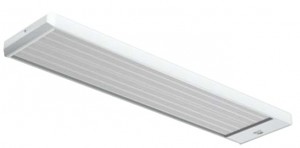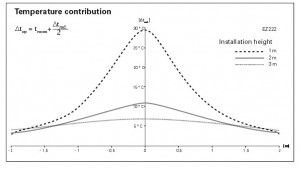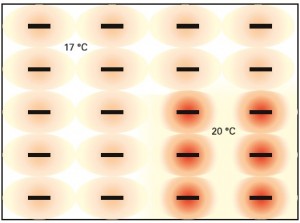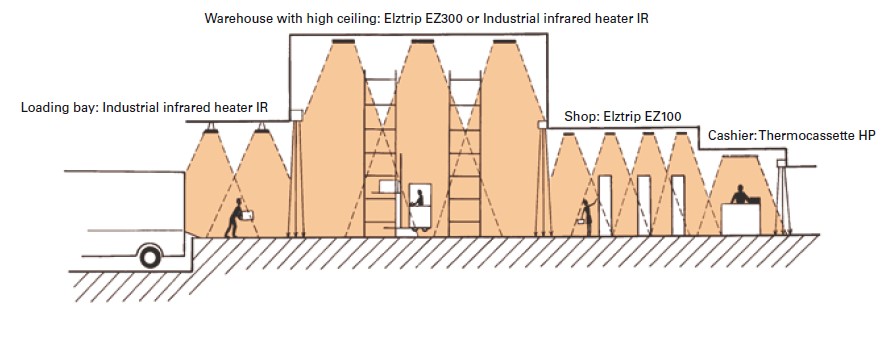 Add My Company
Add My Company
Radiant Heater Mounting Height

Radiant heater mounting height - Avoid hot heads
If you have ever sat in a church or community hall feeling cold but with a hot head then the chances are that you have been exposed to poorly installed radiant heating. Not only that but also the heating is most likely poorly specified. Radiant heater mounting height is important to get right.
Typically an array of heater will be suggested by a supplier. The customer will look at the costs involved and only buy say 1/2 or 2/3 of the suggested heaters. The installer installs them at the recommended height, and then because they don't quite match expectations on heat delivery the installer is called back to extend the hanging chains by a metre or so. The result is hot spots and hot heads.
A quick glance upwards will confirm the problem. The basic rule is that if the height of the heaters is less than the space between the heaters, then there are either not enough heaters or they are too low.
The problem arises when there is not sufficient density of heaters in the application to deliver even heat from the ideal mounting height. For each model of radiant heater there is a recommended mounting height range, but it is important to realise the characteristic temperature contribution at the different heights within the recommended range.

For example the Frico Elztrip 200 range has a mounting height range from 3m to 10m but like any other heater the 'temperature contribution' to the measured temperature at the detection height depends largely on the distance between the heater and the detection point. The formula for this is;
?T top = t room + ?t rad/2
Whilst standing directly under the heater we know from catalogue information that the ?t rad at 1m from the detection point is 30°C and that at 3m it is 7°C, and when worked through the above formula assuming a room temperature of 15°C the hot spot problem becomes obvious.
where distance is 1m , ?T top = 15 + 30/2 = 30°C...
where distance is 3m, ?T top = 15 + 7/2 = 18.5°C
The density of the array of radiant heaters is a simple formula...
Min number of heaters =
Area of room (m2) / (installation height (m) x installation height (m)).

Also factor in the overall heating requirement and the array
With the overall requirement of radiant heating power for the room and the number of heaters as a guide, an array of suitable output heaters can be designed to suit the shape of room ensuring equidistant spacing of the heaters.
The output of the heaters will vary according to both the actual range and the heater size within the range. Generally ranges are suited to different ceiling heights and types of application.

In larger more open installations it is common practice to use a higher density deployment of heaters round the edge of the room and relatively lesser density inside the outer edge. The mounting hight needs to be more than the spacing of the heaters and the heaters output should be 'mutually supporting' so that when experienced, the warmth is even.
For more information on Radiant Heater Mounting Height talk to Puravent

